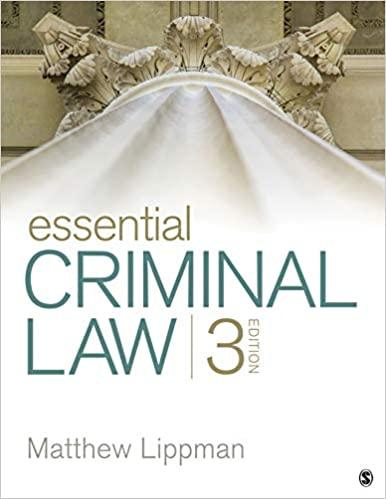Question
i need to answer this questions Question 1 In Miller v. California, the test to determine if a creative work is obscene is: Question 1
i need to answer this questions
Question 1
In Miller v. California, the test to determine if a creative work is obscene is:
Question 1
In Miller v. California, the test to determine if a creative work is obscene is:
a. whether the average person, applying contemporary standards, would find the work taken as a whole appeals to a prurient interest.
b. whether the work depicts or describes, in a patently offensive way, sexual conduct specifically defined by applicable state law.
c. whether the work taken as a whole lacks serious literary, artistic, political, or scientific value.
d. If all three tests are met, the work may be considered obscene and may be prohibited.
Question 2
The Articles of Confederation preceded the Constitution, but they gave the national government insufficient power.
True
False
Question 3
Nevada passed a law banning all commercial billboards along state highways to rid the state highways of billboards, which are offensive to citizens. If this law were to be challenged, which of the following would a court examine to determine if the law is constitutional?
a. It would have to be established that the law furthers an interest of the state of Nevada to create more aesthetically pleasing environment.
b. It would have to be shown that the law directly advances the state's goal of a more aesthetically pleasing environment.
c. It would have to be shown that the law reaches no further than necessary to promote the state goal.
d. All of the above.
Question 4
Powers not given to the federal government in the U.S. Constitution are reserved to the states under the 10th Amendment.
True
False
Question 5
Hall was arrested for burning the American flag in a protest of governmental policy. His action is protected under the First Amendment's guarantee of free speech because flag burning is considered symbolic speech.
True
False
uestion 6
A governmental classification based on gender would be subject to strict scrutiny.
True
False
Question 7
Judicial review can best be described as the power of federal courts to:
a. review state court decisions.
b. review state executive action.
c. review state and federal legislative and executive action.
d. none of the above.
uestion 8
Obscene speech is not protected by the First Amendment.
True
False
uestion 9
In Obergefell v. Hodges, the U.S. Supreme Court held:
a.
Marriage is a fundamental right, and it cannot be denied to same sex couples.
b.
Marriage is not a fundamental right, and state laws may prohibit same sex marriage.
c.
Marriage is a fundamental right, but it can be denied to a same sex couple if there is a compelling justification for doing so.
d.
Marriage is a fundamental right, but state law can prohibit same sex marriage if the state has a rational basis for doing so.
Question 10
Generally, constitutional protections do NOT apply to:
a. acts of the federal government.
b. acts of state government.
c. acts of administrative agencies.
d. acts of privately owned businesses.
Question 11
The Takings Clause prevents the government from taking private property for any reason.
True
False
Question 12
Article I, Section 8 of the U.S. Constitution enumerates those areas on which Congress may pass legislation.These are called the "enumerated powers".
True
False
Question 13
Three key powers given to the judicial branch under the U.S. Constitution include appointment, legislation and foreign policy.
True
False
Step by Step Solution
There are 3 Steps involved in it
Step: 1

Get Instant Access to Expert-Tailored Solutions
See step-by-step solutions with expert insights and AI powered tools for academic success
Step: 2

Step: 3

Ace Your Homework with AI
Get the answers you need in no time with our AI-driven, step-by-step assistance
Get Started


